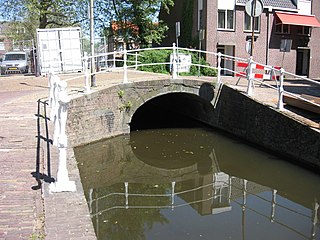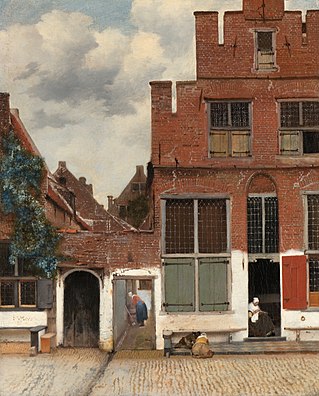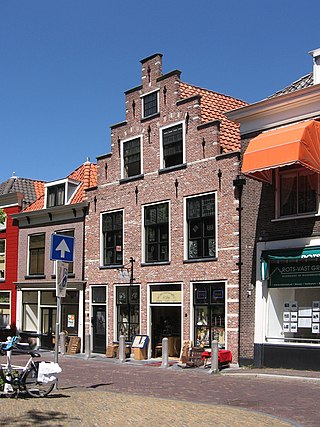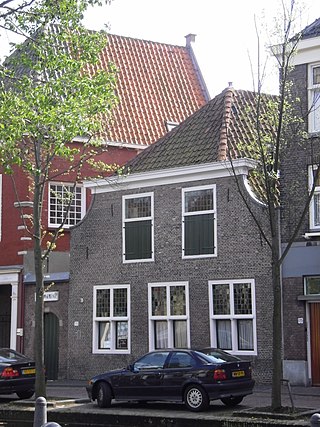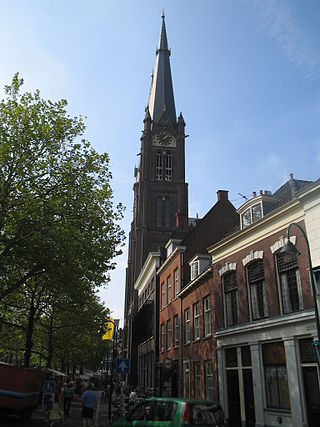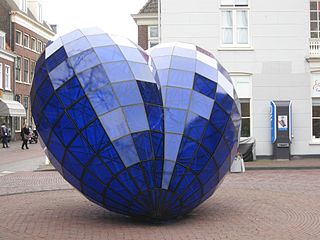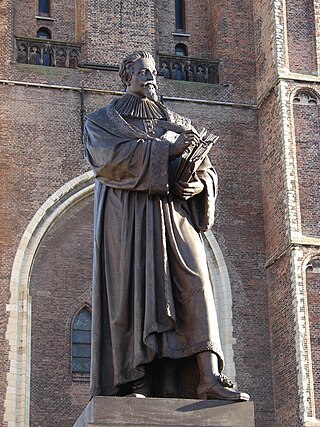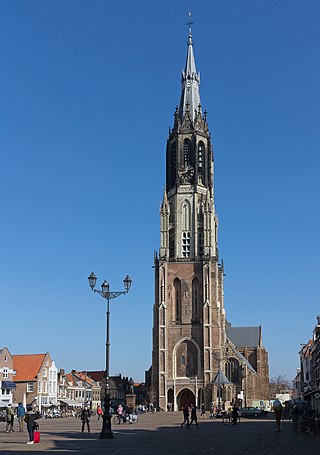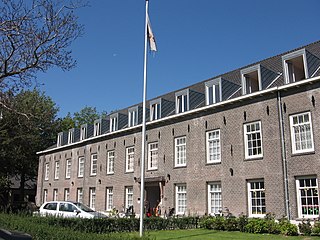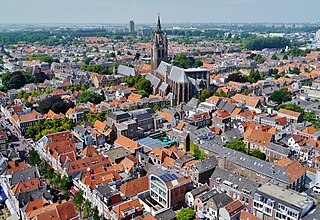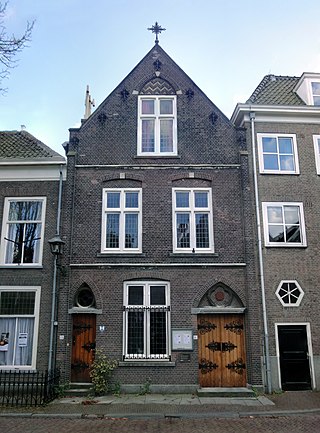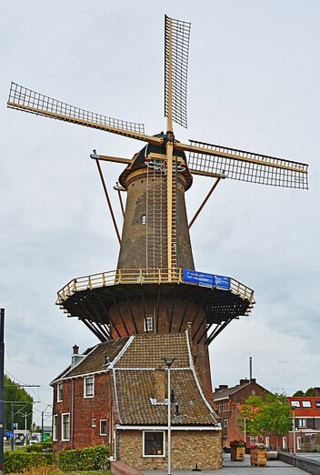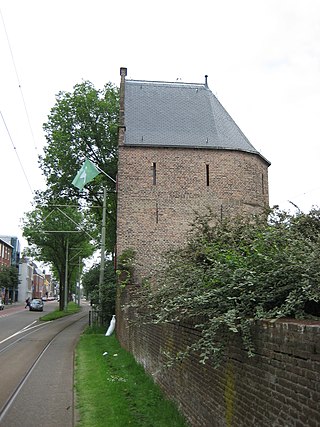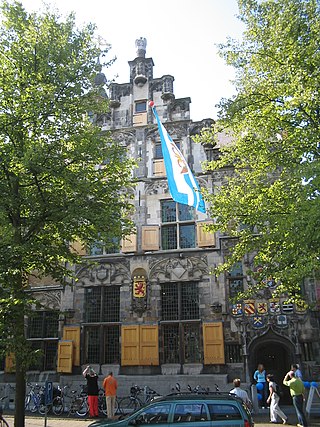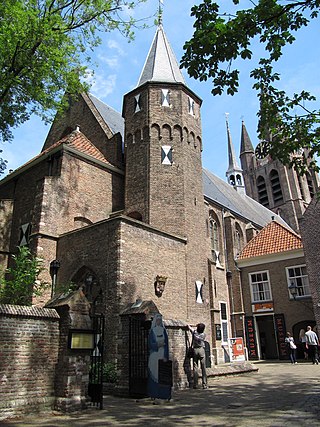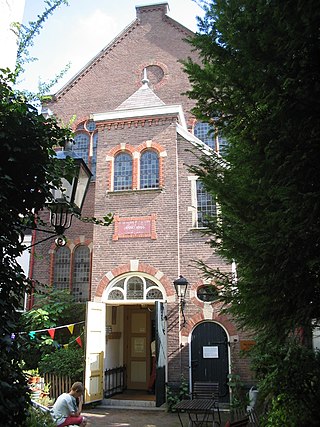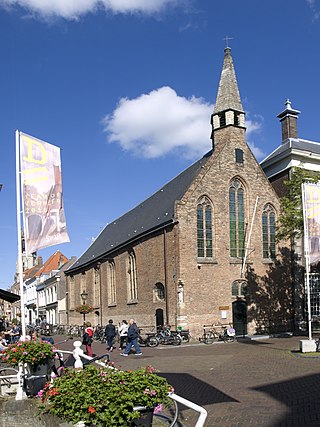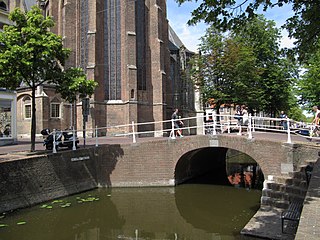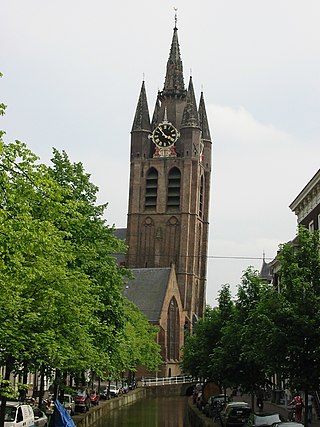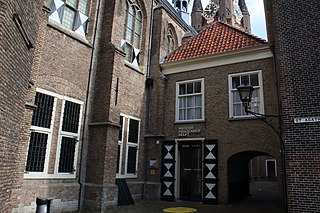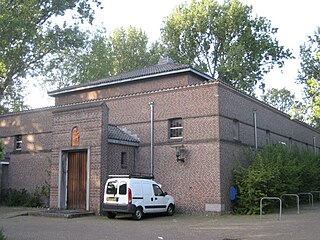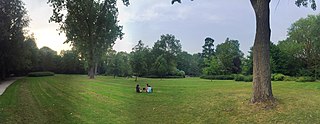Self-guided Sightseeing Tour #3 in Delft, Netherlands
Legend
Guided Free Walking Tours
Book free guided walking tours in Delft.
Guided Sightseeing Tours
Book guided sightseeing tours and activities in Delft.
Tour Facts
5.5 km
39 m
Experience Delft in Netherlands in a whole new way with our free self-guided sightseeing tour. This site not only offers you practical information and insider tips, but also a rich variety of activities and sights you shouldn't miss. Whether you love art and culture, want to explore historical sites or simply want to experience the vibrant atmosphere of a lively city - you'll find everything you need for your personal adventure here.
Individual Sights in DelftSight 1: Drogerijbrug
The Drogerijbrug is an arch bridge in the center of the city of Delft, in the Dutch province of South Holland. The bridge bridges the Vlamingstraat and is a national monument. The bridge was lowered in 1950.
Sight 2: Straatje van Vermeer
The Little Street is a painting by the Dutch painter Johannes Vermeer, executed c. 1657–1658. It is exhibited at the Rijksmuseum of Amsterdam, and signed, below the window in the lower left-hand corner, "I V MEER".
Sight 3: De dreye Claveren
The dreye Claveren is a house in the center of the city of Delft, in the Dutch province of South Holland. The building is a national monument.
Sight 4: Schout van der Meerbrug
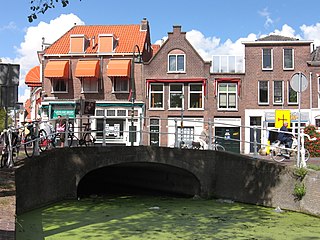
The Schout van der Meer Bridge is a concrete arch bridge in Delft, in the Dutch province of South Holland. The bridge connects the water of the Vrouwenregt and the Oosteinde and the streets Oude Langendijk and Nieuwe Langendijk. The bridge is a national monument
Sight 5: Hopbrug
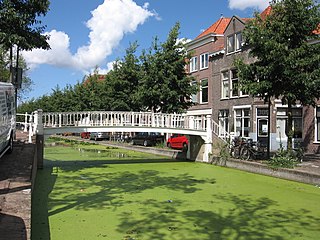
The Hopburg is a pedestrian bridge made of iron and stone in the center of the Dutch city of Delft, province of South Holland. The bridge is a national monument and was probably built in 1865.
Sight 6: Gereformeerde Gemeente
The building Oosteinde 175 is a simple church in the city of Delft, in the Dutch province of South Holland. Originally, the building was built in the second half of the 17th century as a residence. The house was previously part of the pottery factory De Porceleyne Fles. The church building is a national monument, in which a congregation from the church federation of the Reformed Congregations currently meets.
Sight 7: Maria van Jessekerk
The Maria van Jesse Church is a neo-Gothic Roman Catholic parish church in the city of Delft, in the Dutch province of South Holland. The church was built in the period 1875 - 1882 and designed by Evert Margry, a pupil of P.J.H. Cuypers. Originally this church was dedicated to Saint Joseph, but since 1971 to Mary of Jesse. The church is now part of the Sint Ursula parish, which includes all Catholic parish churches in Delft. The church is built in the shape of a cross.
Sight 8: Het Blauwe Hart
The Blue Heart is a work of art in the center of the Dutch city of Delft from 1998, designed by Marcel Smink. The artwork consists of blue glass panels on a stainless steel frame. The artist wants to refer to the technical 'heart' of Delft, namely the Technical University. The colour of the glass refers to Delft blue.
Sight 9: Oudemanhuisbrug
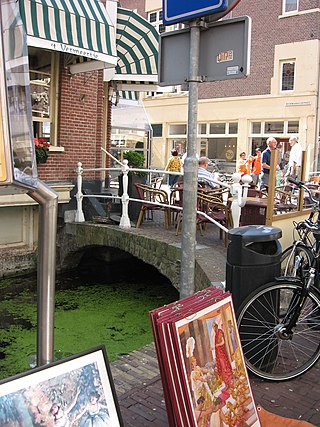
The Oudemanhuis Bridge is a brick arch bridge in the center of the city of Delft, in the Dutch province of South Holland. The bridge, which spans the Voldersgracht, is a national monument. It is not known what year the bridge comes from.
Sight 10: Hugo Grotius
The statue of Hugo Grotius was erected in memory of the Delft-born jurist and Remonstrant leader Hugo Grotius. The statue, dating from 1886, was commissioned by a national committee, which had organised a competition for this purpose. The design, chosen from seventeen entries, is by the Haarlem sculptor F.L. Stracké jr. The bronze statue was cast in the Van Merkelbach factory of Enkhuizen & Co. in Breda and is placed on a high pedestal that was carved in Berlin at the Kessel & Röhl stonemasonry. The statue stands in the middle of the Markt and faces the town hall and has its back to the Nieuwe Kerk. The statue is part of the protected cityscape of Delft and is a national monument.
Sight 11: New Church
The Nieuwe Kerk is a Protestant church in the city of Delft in the Netherlands. The building is located on Delft Market Square (Markt), opposite to the City Hall. In 1584, William the Silent was entombed here in a mausoleum designed by Hendrick and Pieter de Keyser. Since then, members of the House of Orange-Nassau have been entombed in the royal crypt. The latest members to have been entombed are Queen Juliana and her husband Prince Bernhard in 2004. The private royal family crypt is not open to the public. The church tower, with the most recent recreation of the spire, was designed by Pierre Cuypers and completed in 1872. It is the second highest in the Netherlands, after the Domtoren in Utrecht.
Sight 12: Vrouwe van Rijnsburgerbrug
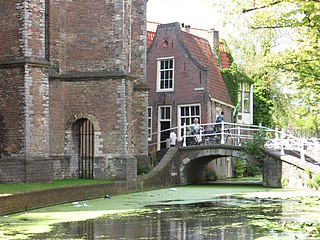
The Vrouwe van Rijnsburgerbrug is a brick arch bridge in the center of the city of Delft, in the Dutch province of South Holland. The bridge is located right next to the Nieuwe Kerk and is a national monument. The bridge dates from the 16th century and is therefore one of the oldest bridges in Delft.
Sight 13: Drapeniersbrug
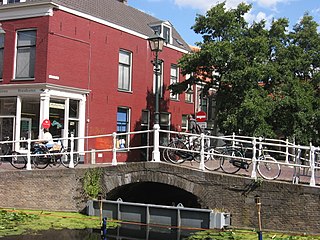
The Drapeniersbrug is a bridge in the center of the Dutch city of Delft, in the province of South Holland. The bridge is a national monument. The bridge possibly dates from the 18th century and bridges the moat.
Sight 14: Artilleriekazerne
The Artillery Warehouse and Barracks are two structures on the horse market in the town of Delft, in the Dutch province of South Holland. Both objects are recognized as national monuments.
Sight 15: De Delftse Donderslag, 1654
Delft is a city and municipality in the province of South Holland, Netherlands. It is located between Rotterdam, to the southeast, and The Hague, to the northwest. Together with them, it is a part of both the Rotterdam–The Hague metropolitan area and the Randstad.
Sight 16: Rapenbloembrug
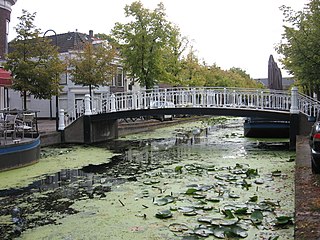
The Rapenbloembrug is a step bridge with a stone deck on iron girders, in the center of the Dutch city of Delft, province of South Holland. The bridge is a national monument. and was built in 1891.
Sight 17: Visbrug
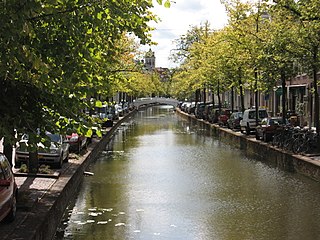
The Visbrug is an iron footbridge from the late 19th century, in Venetian-like neo-Renaissance forms, in the center of the Dutch city of Delft, province of South Holland. The bridge is located at the Voorstraat, and is a national monument.
Sight 18: STALPAERT van de WIELE
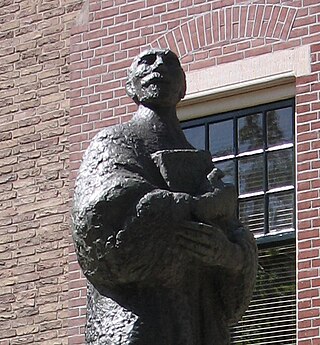
Johannes Stalpaert van der Wiele studied in Rome and Leuven and became a priest in Delft. In addition to the priesthood, he was a writer. He wrote hymns to saints. He was also an important writer of the Counter-Reformation, he wrote battle poems against the Reformed doctrine. He was buried in the Oude Kerk in Delft.
Sight 19: Oud-Katholieke Parochie van de HH Maria en Ursula
The HH. Maria en Ursulakerk is an old Catholic parish church at the Bagijnhof in the city of Delft, in the Dutch province of South Holland.
Sight 20: De Roos
De Roos, also locally known as Roosmolen or Koren op de Molen, is a wind and platform mill situated within the municipality of Delft, in the South Holland province of the Netherlands.
Sight 21: Bagijnetoren
The Bagijne Tower in the city of Delft, in the Dutch province of South Holland, was originally built as a watchtower and was part of the reinforcement of the city walls of Delft. On 15 April 1246, the city of Delft was granted city rights and thus also acquired the right to build a wall around the city. The Bagijnetoren is a later addition to the fortifications that was probably built around the year 1500.
Sight 22: Gemeenlandshuis
The Gemeenlandshuis in Delft, in the Dutch province of South Holland, is the headquarters of the Delfland Water Board. The late Gothic house at Oude Delft 167 was built in 1505. The first owner was Jan de Heuyter, who was bailiff of Delft and bailiff of Delfland. He was also a tenant of excise duty on hops. The house was therefore also called "House with the bells" after the interior decoration with hop cones. Because of the collaboration of the De Huyter family with the Spaniards, they were evicted from their house in 1572 and the house was confiscated. Subsequently, the house provided temporary accommodation for the Hof van Holland before it was transformed into s Heeren Herberghe, a lodging house for important guests of the city and the States of Holland. Later, the building was the residence of Philip, Count of Hohenlohe who was married to Maria of Nassau, a daughter of William of Orange. Since 1645, the Delfland Water Board has been located there.
Sight 23: Waalse Kerk
The Walloon Church in the city of Delft, in the Dutch province of South Holland, was a monastery church of the former St. Agatha monastery, which is now known as the Prinsenhof.
Sight 24: Sociëteit Tyche
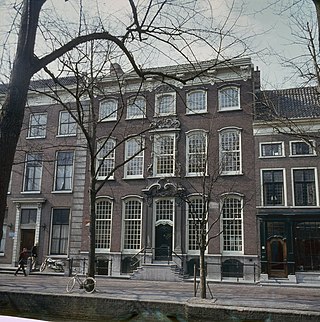
Society "Tyche" is part of the Delftsche Studenten Bond (DSB) and is located in the monumental building Oude Delft 123 in Delft, in the Dutch province of South Holland. It is the building that has served as a society in the Netherlands for the longest time. Before the Delftsche Studenten Bond moved into it in 1953, it had been the Standvastheid society since 1803. The building is a national monument.
Sight 25: Haverbrug
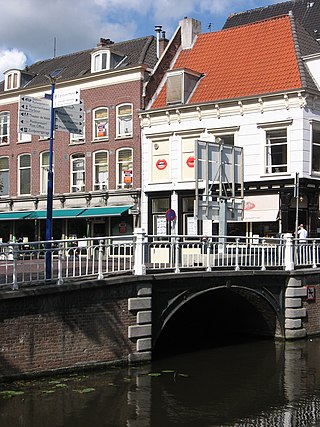
The Haverbrug is a masonry arch bridge with iron front plates in the center of the city of Delft, in the Dutch province of South Holland. The bridge is a national monument and was probably built in the year 1872.
Sight 26: Mauriciusbrug
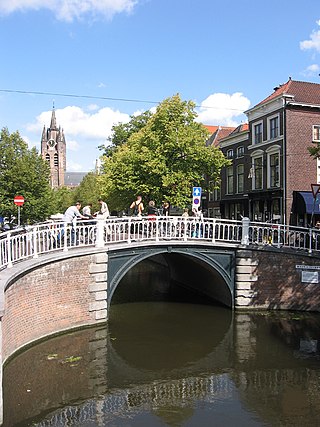
The Mauricius Bridge is a bridge in the city of Delft, in the Dutch province of South Holland. The arch bridge, presumably designed by C.J. de Bruyn Kops, was built in the style of eclecticism around 1872. The bridge spans the Oude Delft between the Binnenwatersloot and the Peperstraat. The last restoration took place in 2000.
Sight 27: Génestetkerk
The Génestetkerk is a Remonstrant church from 1896 in the city of Delft, in the Dutch province of South Holland. The church is located behind a gate on the Oude Delft in a courtyard on the site of the former clandestine church. It is a design by Leonard Couvée. The church is named after the preacher and poet P.A. de Génestet.
Sight 28: Sint Hippolytuskapel
The Saint Hippolytus Chapel is a chapel in the old city of Delft. It is one of the oldest buildings in Delft, and since 1967 it has been designated the Rijksmonument.
Sight 29: Hof van Delftsebrug
The Hof van Delftbrug is a brick arch bridge in the center of the Dutch city of Delft, province of South Holland. The bridge is a national monument and was built in the 18th century.
Sight 30: Poelbrug
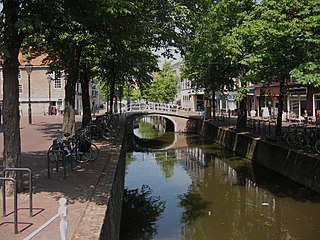
The Poel Bridge, in the Dutch province of South Holland, is a brick arch bridge in the center of Delft near the Oude Kerk. The bridge is a national monument and dates from the 18th century and bridges the water of the Voorstraat.
Sight 31: Old Church
The Oude Kerk, nicknamed Oude Jan and Scheve Jan, is a Gothic Protestant church in the old city center of Delft, the Netherlands. Its most recognizable feature is a 75-meter-high brick tower that leans about two meters from the vertical.
Sight 32: Het Prinsenhof
Het Prinsenhof is a museum in the city of Delft in the Netherlands. Formerly the monastery of St Agatha, the building changed purpose over time. The whole building came into the possession of Delft City Council by 1925, who gradually converted the building into a museum. Today, the museum shows a variety of art from Dutch Golden Age paintings, prints, cermaics and contemporary art.
Sight 33: Stanislaskapel
The St. Stanislas Chapel is a Roman Catholic chapel in the Dutch province of South Holland. The chapel is connected to the adjacent Stanislas College and the community of the Jesuit Fathers.
Sight 34: Wilhelminapark
The Wilhelminapark is a city park in Delft in the English landscape style.
Share
Disclaimer Please be aware of your surroundings and do not enter private property. We are not liable for any damages that occur during the tours.
GPX-Download For navigation apps and GPS devices you can download the tour as a GPX file.
